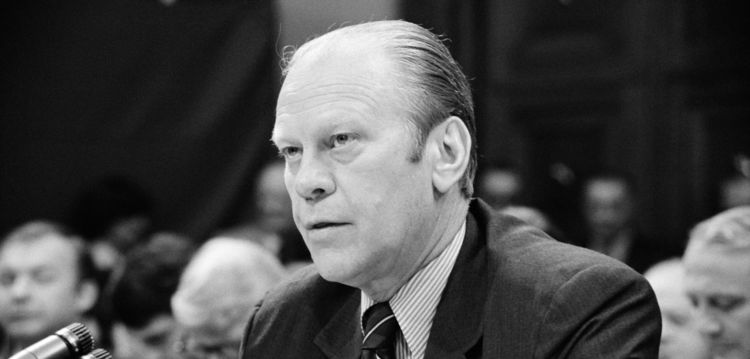
12/28/2006
Gerald R. Ford was a good man who served his country well in an evil time.
When he took office on Aug. 9, 1974, and declared, "Our long national nightmare is over," Ford did not fully appreciate that those who had done the most to create the nightmare were still here. The Establishment that Nixon had humiliated in his 49-state landslide, having just effected a coup d'etat, had crawled back into power.
That Establishment, which had hated Nixon since the Alger Hiss case and loathed Spiro Agnew for his wildly popular attacks on the liberal press, embraced "Jerry" Ford, and never more eagerly than when he elevated one of their own, Nelson Rockefeller, to the vice presidency.
August 1974 was the happy hour of American liberalism, when the press discovered that, amazingly, Jerry Ford actually toasted his own English muffins in his kitchen and buttered them himself, before heading off to the White House. How wonderful it all was.
The toasted-muffin phase of the Ford presidency ended abruptly on the Sunday morning that Ford issued a full pardon to Richard Nixon for any and all offenses committed during his presidency.
This city went berserk. Ford was savaged day after day in the press, night after night on the network news. His approval rating sank 40 points. The air was poisonous, with accusations of a "deal" by which Ford got the presidency in return for Nixon getting the pardon.
In an address to Congress on Aug. 12, Ford had said, "I don’t want a honeymoon with you, I want a good marriage."
But a Congress that had been denied, by Nixon’s resignation, the pleasure of impeaching, convicting and expelling him from the White House was in no mood for romance. Nor was this city, which had just been robbed of a delicious year-long public trial of the disgraced former president.
A House Judiciary Subcommittee on Criminal Justice directed Ford to appear on Capitol Hill to explain the circumstances of the pardon. Had anything fishy turned up, Congress would have tried to impeach Ford, so rancid was the atmosphere in this city.
Partly because of the pardon, the GOP suffered a loss of 48 House seats that November. In January 1975, a radical Congress was sworn in, determined to end all aid to our allies in Southeast Asia, bring about their defeat, then tear apart the CIA and FBI.
In April, Hanoi, with massive Soviet aid, launched an invasion of South Vietnam. Ford went to Congress to beg for assistance to our embattled Saigon allies. His request was rebuffed. Two Democrats walked out of the chamber.
Within weeks, South Vietnam and Cambodia had fallen, and Pol Pot’s holocaust had begun. By summer, tens of thousands of Vietnamese had been executed, scores of thousands put into "re-education camps," and the first of hundreds of thousands had pushed off into the South China Sea, where many drowned and others met their fate at the hands of Thai pirates.
Next, Congress went to work on the CIA, with the Pike committee and the Church committee exposing all the evil deeds the agency had done in the cause of trying to win the Cold War.
When Ford suggested that New York, the citadel of liberalism, might itself be responsible for its own bankruptcy — by its cowardice in the face of outrageous union demands — and it was not his duty to bail out the Big Apple, he was attacked as cruel and uncaring.
"Ford to City: Drop Dead!" ran the headline in the New York Daily News.
Whereupon Jerry Ford trooped to the rescue of New York.
By now, however, after Vietnam, Cambodia and Laos had fallen, and the Soviets were on the move in Africa, conservatives had had a bellyful of detente and its personification, Secretary of State Henry Kissinger. The presence of Rockefeller a heartbeat away and the nomination of John Paul Stevens to the Supreme Court did not help.
Ronald Reagan entered the primaries and almost took the nomination. While he endorsed Ford, he declined to run with him. Yet President Ford closed a 30-point gap to 3 points against Jimmy Carter, and had he not declared Eastern Europe not under Soviet domination in one of the Ford-Carter debates, he might have won an upset to rival the 1948 comeback of Harry Truman. But it was not to be.
Gerald Ford was a non-ideological man in an ideological age, a nice man in nasty times. When he took the helm, America was as divided as she had been since the Truman-McCarthy era. When he left in 1977, America had had a unifying Bicentennial of her Declaration of Independence.
Though it was no fault of his own, Gerald Ford presided over the greatest strategic defeat in U.S. history since the loss of China under Harry Truman. And he had failed to win election in his own right.
Yet, he saw the country through an evil time, and his decency showed through throughout.
He was not a great president, but the right man at the right time, who paid an unjust price for having done the right thing.
COPYRIGHT CREATORS SYNDICATE, INC.
Patrick J. Buchanan needs no introduction to VDARE.COM readers; his book State of Emergency: The Third World Invasion and Conquest of America, can be ordered from Amazon.com.
This is a content archive of VDARE.com, which Letitia James forced off of the Internet using lawfare.